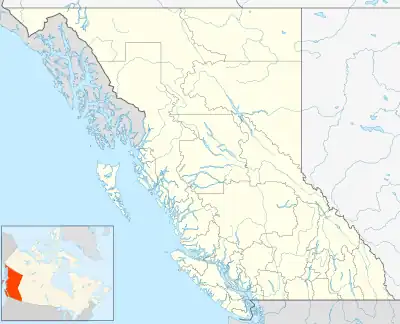Fort Shepherd | |
|---|---|
 Fort Shepherd Location of Fort Shepherd in British Columbia | |
| Coordinates: 49°01′00″N 117°37′00″W / 49.01667°N 117.61667°W | |
| Country | |
| Province | |
Fort Shepherd is the site of a former Hudson's Bay Company fort in the West Kootenay region of southern British Columbia. The fort was on the west side of the Columbia River, across from the mouth of the Pend-d'Oreille River, southwest of Trail.[1][2][3]
References
- ↑ "Fort Shepherd Flats (former locality)". BC Geographical Names.
- ↑ "Nelson Star, 12 May 2014". www.nelsonstar.com. 12 May 2014.
- ↑ Basque Garnet (1982), British Columbia Ghost Town Atlas, Sunfire Publications Limited,
It was originally called Fort Pend Oreille after the River. in 1859, the post was renamed in honor of their company governor who died that year. The border had been set at 49° North Latitude by the Oregon Boundary Treaty of 1846. After ten years of operating Fort Colvile on U.S. soil, the Hudson's Bay Company, feeling the pain of U.S. taxes, decided to relocate in Canada. Angus MacDonald established Fort Pend Oreille right across from the mouth of Pend Oreille River. He thought this location was just north of the border but could not be sure until it was surveyed by John Sullivan in 1860. The company had planned to close Fort Colvile. But, after discovering that the gravely terrace at the new post was not conducive to agriculture, they continued to operate the southern fort for another fifteen years, just to produce the vegetables and hay they needed up north. Fort Pend Oreille comprised several log buildings on the left bank of a tiny ephemeral creek where the terrace was wider upstream from the Pend Oreille. The buildings included a store, two warehouses, barracks for employees, and a cabin to serve as quarters for the factor and his officers. They were all constructed of squared, hand-hewn logs, well notched and tightly fitted at the corners. The buildings that were occupied had double-hung glass windows, stone chimneys and were neatly arranged around an open area, much like a parade ground at a military fort. The Americans referred to the company by its initials, 'HBC', which they mockingly said, stood for, 'Here before Christ'.
This article is issued from Wikipedia. The text is licensed under Creative Commons - Attribution - Sharealike. Additional terms may apply for the media files.